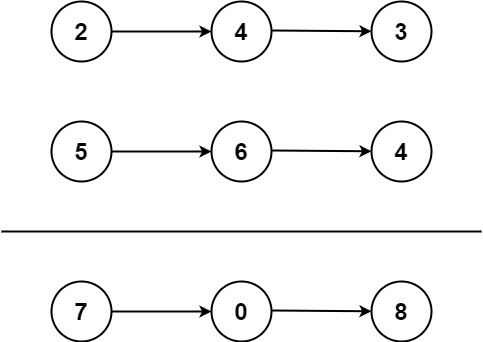Description
You are given two non-empty linked lists representing two non-negative integers. The digits are stored in reverse order, and each of their nodes contains a single digit. Add the two numbers and return the sum as a linked list.
You may assume the two numbers do not contain any leading zero, except the number 0 itself.
Example 1:

Input: l1 = [2,4,3], l2 = [5,6,4]
Output: [7,0,8]
Explanation: 342 + 465 = 807.
Example 2:
Input: l1 = [0], l2 = [0]
Output: [0]
Example 3:
Input: l1 = [9,9,9,9,9,9,9], l2 = [9,9,9,9]
Output: [8,9,9,9,0,0,0,1]
Constraints:
- The number of nodes in each linked list is in the range [1, 100].
0 <= Node.val <= 9- It is guaranteed that the list represents a number that does not have leading zeros.
Solution
c++
1
2
3
4
5
6
7
8
9
10
11
12
13
14
15
16
17
18
19
20
21
22
23
24
25
26
27
28
29
30
31
32
33
34
35
36
37
38
39
40
41
42
/**
* Definition for singly-linked list.
* struct ListNode {
* int val;
* ListNode *next;
* ListNode() : val(0), next(nullptr) {}
* ListNode(int x) : val(x), next(nullptr) {}
* ListNode(int x, ListNode *next) : val(x), next(next) {}
* };
*/
class Solution {
public:
ListNode* addTwoNumbers(ListNode* l1, ListNode* l2) {
int carry = 0;
ListNode *ret = nullptr;
ListNode **indirect = &ret;
while (l1 || l2 || carry) {
int n1 = 0, n2 = 0, n3;
if (l1 != nullptr) {
n1 = l1->val;
l1 = l1->next;
}
if (l2 != nullptr) {
n2 = l2->val;
l2 = l2->next;
}
n3 = n1 + n2 + carry;
if (n3 > 9) {
n3 -= 10;
carry = 1;
} else {
carry = 0;
}
*indirect = new ListNode(n3);
indirect = &((*indirect)->next);
}
return ret;
}
};
Runtime: 20 ms, faster than 95.89% of C++ online submissions for Add Two Numbers.
Memory Usage: 71.1 MB, less than 69.37% of C++ online submissions for Add Two Numbers.
go
1
2
3
4
5
6
7
8
9
10
11
12
13
14
15
16
17
18
19
20
21
22
23
24
25
26
27
28
29
30
31
32
33
34
35
36
/**
* Definition for singly-linked list.
* type ListNode struct {
* Val int
* Next *ListNode
* }
*/
func addTwoNumbers(l1 *ListNode, l2 *ListNode) *ListNode {
carry := 0
var ret *ListNode = nil
var indirect **ListNode = &ret
for (l1 != nil || l2 != nil || carry != 0) {
n1, n2, sum := 0, 0, 0
if l1 != nil {
n1 = l1.Val
l1 = l1.Next
}
if l2 != nil {
n2 = l2.Val
l2 = l2.Next
}
sum = n1 + n2 + carry
if sum > 9 {
sum -= 10
carry = 1
} else {
carry = 0
}
*indirect = &ListNode{ Val: sum, Next: nil }
indirect = &((*indirect).Next)
}
return ret
}
Runtime 8 ms Beats 90.51%
Memory 4.7 MB Beats 46.14%